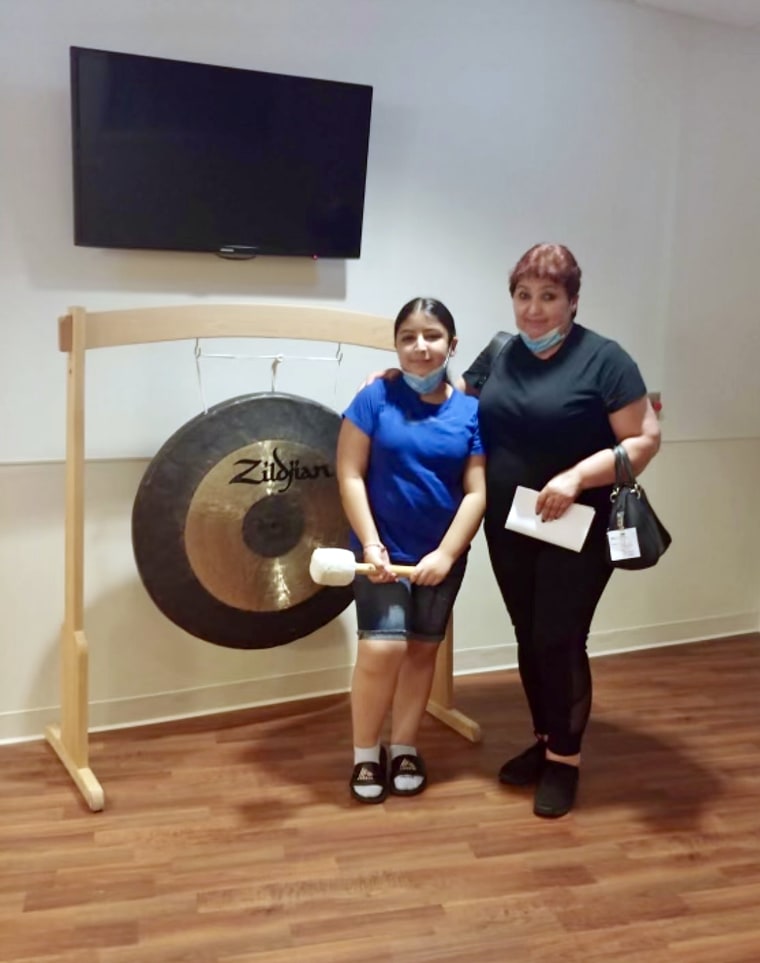For a month in 2020, Liliana Castaneda, then 14, bled every day. While she originally thought it was her first period, she soon became worried when the bleeding became heavier and wouldn’t stop.
She’d become anemic “because I had been bleeding,” Castaneda, 19, from Chicago, tells TODAY.com. “I had no energy.”
While doctors first dismissed her heavy bleeding as stress from the COVID-19 pandemic, she soon learned what was wrong — she had clear cell carcinoma, a type of vaginal cancer that is rare for someone so young. She was shocked by the news.
“I heard it,” she says. “But I didn’t really understand it.”
Heavy Bleeding Dismissed by Her Doctor
Castaneda has a condition called Turner syndrome, a rare genetic condition where females are missing one, or part, of their X chromosome, according to the Mayo Clinic. While it can cause some physical differences and impact a girl’s growth, her ovaries do not develop, so she’ll never menstruate.
When she started bleeding monthly at 14, she thought maybe she was going through puberty despite her diagnosis and felt excited by it. Soon, Castaneda realized what she was experiencing wasn’t normal.
“What I thought was a period ended up not being (one),” she says.
Soon, the bleeding became heavier with Castaneda saturating a pad every 15 minutes. She also bled every day, which made her feel tired. Sometimes, when she stood up, she felt dizzy. At the time, she was at home during the COVID-19 lockdown, which made managing some of the symptoms a little easier.
After about a month of constant bleeding, she made an appointment with her doctor, Castaneda says. But her doctor dismissed her.
“At first, they thought it was just stress,” she says.
Her doctor gave her birth control to manage the bleeding, but it didn’t help. When two months passed with no end to her symptoms, she returned to visit her doctor.
“I was still bleeding,” she says.
This time, her doctor ran testing first, conducting an ultrasound, but they “couldn’t see clearly,” so they decided to conduct a pelvic exam. Following that, they sent her for more testing.
“That’s when they did a biopsy,” Castaneda says.
Three days later, Castaneda learned what was wrong.
Clear Cell Carcinoma of the Vagina
Clear cell carcinoma is a “subtype of vaginal cancer,” where the cells under a microscope almost look clear, says Dr. Dario Roque, a gynecological oncologist at Northwestern Medicine. It’s normally seen in post-menopausal women, but generally, “vaginal cancer is pretty rare,” Roque tells TODAY.com. The American Cancer Society estimates that vaginal cancer accounts for about 1% to 2% of female reproductive cancers.
Castaneda had Stage 2 clear cell carcinoma in her vagina and a mass the size of a “golf ball.” That tumor and her delayed diagnosis likely led to the excessive bleeding she experienced.
“The mass definitely grew,” he says. “To me, her tumor was large enough by the time she came to us, I wasn’t surprised her bleeding was still heavy.”

While he says it’s normal for doctors to consider a period when a 14-year-old has vaginal bleeding, it shouldn’t have been considered in Castaneda’s case because she has Turner syndrome.
“That should have really never been on the differential diagnosis or the potential possibilities,” Roque says. “Their ovaries are not working, so they don’t go into menarche.”
Treatment of vaginal cancer depends on the size and location of the tumor. If the mass is small enough that surgeons can remove it with clear margins, surgery can be an option. Sometimes radiation is needed in those cases. But for Stage 2 or above, “surgery is not really optimal.”
“You cannot get around the tumor, and that’s the reason we rely more on radiation because radiation can treat the whole tumor,” Roque says. “It’s very effective in killing the cancer cells.”
Patients might also receive a lower dose of chemotherapy called radiosensitive chemotherapy that helps “the radiation work better.” Castaneda received this course of chemotherapy and radiation to treat her cancer.
Signs of vaginal cancer include:
- A feeling of pressure in the vagina
- A mass or lump in the vagina that one can feel
The outlook seems positive for Castaneda.
“Her most recent exam from last week was pretty normal,” Roque says. “We all feel pretty confident that this is not a cancer that will come back.”
‘Get a Second Opinion’
Castaneda is in her second year of college studying to be a pediatric nurse to someday help others like her team at Northwestern Medicine cared for her. While it was tough having cancer at a young age, listening to music helped her cope. In her free time now, she plays video games.
Throughout this experience, she learned that she “can do anything.”
Castaneda shared her story because she wants others to feel empowered to speak up if something seems wrong with their health.

“If something’s concerning you, you should always ask (for help),” she says. “Get a second opinion.”
